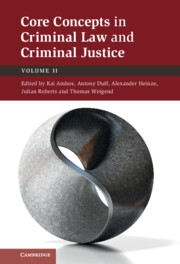Book contents
- Core Concepts in Criminal Law and Criminal Justice
- Core Concepts in Criminal Law and Criminal Justice
- Copyright page
- Contents
- About the Authors
- Abbreviations
- 1 Introduction to Volume II
- Part I Criminal Law
- 2 Structures within Criminal Legal Reasoning
- 3 Causation and Responsibility for Outcomes
- 4 Imputation of Responsibility and Intoxicated Offending
- 5 Crimes of Endangerment
- Part II Criminal Procedure
- Part III Criminal Justice
- Index
- References
5 - Crimes of Endangerment
from Part I - Criminal Law
Published online by Cambridge University Press: 24 February 2022
- Core Concepts in Criminal Law and Criminal Justice
- Core Concepts in Criminal Law and Criminal Justice
- Copyright page
- Contents
- About the Authors
- Abbreviations
- 1 Introduction to Volume II
- Part I Criminal Law
- 2 Structures within Criminal Legal Reasoning
- 3 Causation and Responsibility for Outcomes
- 4 Imputation of Responsibility and Intoxicated Offending
- 5 Crimes of Endangerment
- Part II Criminal Procedure
- Part III Criminal Justice
- Index
- References
Summary
Criminal laws typically contain a wide variety of offences that target dangerous behaviour. Our goal in this chapter is to compare the ways in which German and English criminal law deal with these kinds of offence; to clarify some distinctions that need to be drawn (and that can be discerned, more or less explicitly, in existing laws) if we are to understand the logic and rationale of such offences; and to note some of the normative issues that such offences raise. To that end, we begin (in section II) by distinguishing endangerment offences in a narrower sense from another important category of dangerous conduct without harmful outcome, that is, attempts. If one speaks of endangerment in a wider sense, attempts would fall into this category, but we will limit our analysis to endangerment offences in the narrower sense.
- Type
- Chapter
- Information
- Core Concepts in Criminal Law and Criminal Justice , pp. 132 - 166Publisher: Cambridge University PressPrint publication year: 2022

